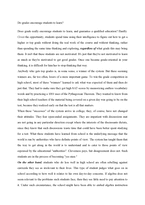영문 Do grades encourage students to learn영어작문
Does grade really encourage students to learn, and guarantee a qualified education? Hardly. Given the opportunity, students spend time using their intelligence to figure out how to get a higher or top grade without doing the real work of the course and without thinking, rather than spending the same time thinking and exploring, regardless of what grade this may bring them. It isnt that these students are not motivated. Its just that theyre not motivated to learn as much as theyre motivated to get good grades. Once one became grade-oriented in your thinking, it is difficult for him/her to stop thinking that way.
Anybody who gets top grades is, in some sense, a winner of the system. But these seeming winners are, far too often, losers of a more important game. To win the grade competition in high school, most of these "winners" learned to ask what was expected of them and then do just that. They had to make sure they got high SAT scores by memorizing endless vocabulary words and by practicing a 1001 uses of the Pythagorean Theorem. They wanted to know from their high school teachers if the material being covered on a given day was going to be on the test, because they realized early on that the test is all that matters.
When these "successes" of the system arrive in college, they, of course, have not changed their attitudes. They fear open-ended assignments. They are impatient with discussions mat are not going in any particular direction except where the interests of the discussants dictate, since they know that such discussions waste time that could have been better spent studying for a test. What these students have learned from school is the underlying message that the world is run by authorities who have definite points of view. The system has taught them that the way to get along in the world is to understand and to cater to those points of view espoused by the educational "authorities". Cleverness pays, but disagreement does not. Such students are in the process of becoming "yes men."
On the other hand, students who do less well in high school are often rebelling against curricula they see as irrelevant to their lives. This type of student judges what goes on in school according to how well it relates to his own day-to-day concerns. If algebra does not seem relevant to the problems such students face, then they see little need to pay attention to it. Under such circumstance, the school might have been able to embed algebra instruction inside a task they cared about, causing them to want to know algebra because it would help them do something they wanted to do. But schools generally dont think like this, so the conclusion drawn by many students is mat since so much is irrelevant, they might as well tune it out. These students learn to get by as well as they can, separating themselves from other kids who are willing to play the game.

- 오늘 본 자료가 없습니다.
- 돈으로 살 수 없는 것들 독후감 (돈으로 살 수 없는 것들 독후감 목차별 내용요약 / 책 내용 중 흥미로운 사례 / 느낀점과 독후감)
- 클라우스 슈밥의 제4차 산업혁명 독후감 (내용요약.가장 기억에 남는 내용과 나의의견,이 책을 읽고 든 생각,독후감)
- 침묵의 봄 줄거리,교훈,비평,독후감
- 프로페셔널의 조건 - 단순한 직업 지침서를 넘어 삶의 방향과 가치관을 제시하는 철학 서적(A+독후감)
- 오베라는 남자(프레드릭 배크만) - 삶의 의미, 소통의 중요성, 인간관계, 용기, 희망 등에 대한 메시지를 전달하며, 우리 삶에 큰 영감을 주는 책(+A독후감)
해당 정보 및 게시물의 저작권과 기타 법적 책임은 자료 등록자에게 있습니다. 위 정보 및 게시물 내용의 불법적 이용,무단 전재·배포는 금지되어 있습니다. 저작권침해, 명예훼손 등 분쟁요소 발견 시 고객센터에 신고해 주시기 바랍니다.





 분야
분야

